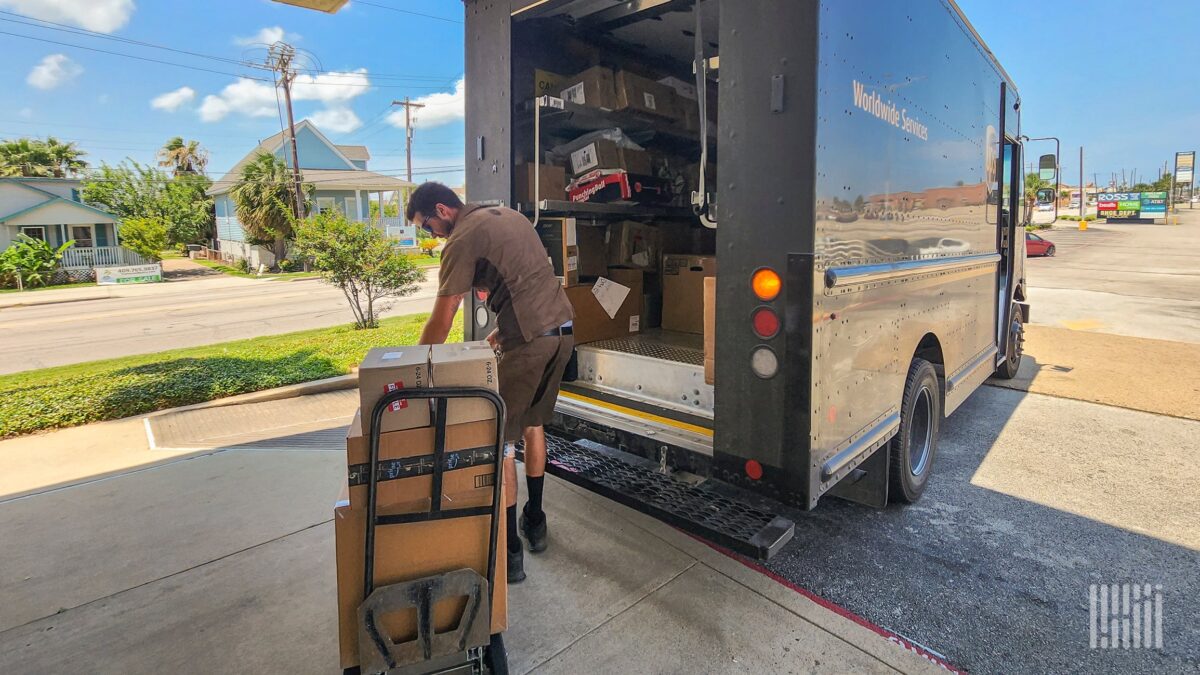UPS’ domestic parcel volumes returned to growth in the second quarter for the first time since late 2021, but the company’s stock was down 13% late Tuesday as revenue and operating profit fell below analysts’ predictions and the parcel logistics company tightened full-year guidance.
UPS now projects 2024 revenue of $93 billion versus a previous forecast of up to $94.5 billion and capital expenditures of $4 billion, $500 million less than before.
It’s been a busy few weeks for UPS (NYSE: UPS). The company on Monday announced it has entered into an agreement to acquire Estafeta, a Mexican express delivery and logistics company, to take advantage of the nearshoring trend and increase its logistics capabilities in Mexico. The acquisition, targeted to close by the end of year, builds on a 2020 commercial agreement between the two companies.
Earlier this month, UPS promoted Brian Dykes to chief financial officer to replace Brian Newman, who resigned because of health reasons. In June it said it would sell truck brokerage business Coyote Logistics to RXO for $1 billion – $750 million less than it paid for the company in 2015.
UPS is also beginning to pick up volume from its new domestic air cargo contract with the U.S. Postal Service as the transition from FedEx gets underway ahead of the official Oct. 1 start date.
The Atlanta-based logistics integrator on Tuesday reported second-quarter operating revenue of $21.8 billion – $440 million below expectations and 1% lower than the same period last year. Adjusted operating income of $2 billion was down 29.3% year over year and 11% below consensus estimates.
The miss was mainly in the U.S. domestic segment, where operating income of $997 million came in 18% below expectations. Domestic revenues fell 2% year over year, primarily due to shippers switching to cheaper ground transport from premium express and favoring SurePost over ground, which led to a 3% decline in average revenue per piece. UPS SurePost is an economy service that involves handing off packages to the U.S. Postal Service for final-mile delivery. As a result, total air average daily volume declined 7.8%, daily ground volume increased 2.3% and SurePost daily volume grew 25%.
“We also saw an acceleration of new ecommerce customers that were coming into the market that are quite frankly running a different model than our traditional customers and are highly leveraging our SurePost product,” said Dykes on a briefing call with analysts.
Operating income for Supply Chain Solutions, the company’s contract logistics and freight forwarding business, was 21.4% below consensus at $234 million.
Better-than-expected International performance could not offset results elsewhere. The International segment slightly exceeded expectations, posting earnings before income and taxes of $824 million on a 6% y/y gain in revenue as improved yields overcame softer volumes.
International volumes were boosted by strong e-commerce demand, particularly out of China, and higher rates as market demand outpaced capacity. But ocean volume and revenue were down year over year.
UPS said it closed 35 sort operations, including five buildings, during the first half as part of a five-year network redesign and plans five more operational closures this year. It also reduced dispatch staffing by 26% in the quarter by automating the dispatch process for package car and feeder drivers.

CEO Carol Tomé said UPS recently enhanced its international network in Taiwan and Europe. The company expanded capacity in Taiwan by 30% and extended pickups to as late as midnight to help Taiwanese businesses, including those in high-tech manufacturing and automotive, reach the critical European market within two days. Meanwhile, the distribution facility near Frankfurt airport in Germany has added 25% more space to better support multimodal distribution to the growing technology and health care industries in Central Europe.
Management signaled in March that the first half would be the most challenging, with earnings down 30% year over year and returning to growth in the final two quarters as the initial cost increase from last year’s Teamsters labor contract wears off. The revised guidance suggests headwinds are still substantial despite an improving economic environment for freight.
Tomé acknowledged that B2B business has still not fully recovered from the Teamsters contract negotiations, which led many customers to flee for other carriers to avoid a potential strike that would have disrupted deliveries.
UPS said it made a $94 million payment to settle a challenge by Italian tax authorities to the deductibility of value-added tax payments by UPS to certain third-party service providers.










